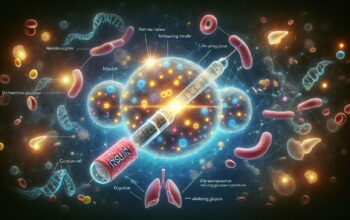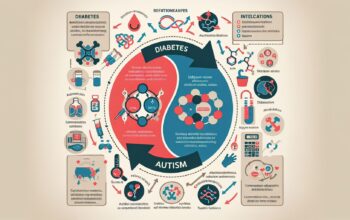You must have heard about diabetes, the rising health problem, notable for its link with high blood sugar. Furthermore, you might also be familiar with Autism, a developmental syndrome marked by social interaction complications. You might be wondering, what’s the connection? For years, researchers have been examining the unparalleled correlation between diabetes and autism. The discoveries, however, are both intriguing and concerning.
From Diabetes to Autism: The Unremarkable Connection
According to the American Diabetes Association, around 34.2 million Americans had diabetes in 2018, while the Center for Disease Control (CDC) states that in the same year, one in 54 children was diagnosed as being on the autism spectrum. At first glance, it might seem that these two dissimilar conditions are unrelated. However, emerging medical studies demonstrate that they may not be so distinct after all.
Maternal Diabetes and Autism Risk
Several studies have indicated that children born to mothers with diabetes—either preexisting or gestational diabetes diagnosed during pregnancy—are at a higher risk for autism spectrum disorders (ASD). A Population-based cohort study published in JAMA in 2018 indicated a correlation between the two. Researchers understand that autism can originate from both genetic and environmental factors, with maternal health during pregnancy playing a vital role in the offspring’s neurological development.
This study’s findings underscore the need for adequate prenatal care and health monitoring for pregnant women who have diabetes. By properly maintaining blood sugar levels during pregnancy, those are critical for the healthy neurological development of unborn babies.
Dealing with Complexity of Co-occurring Conditions
Managing diabetes and autism simultaneously can be a daunting task, mainly because individuals with autism often struggle with maintaining the strict routines necessary to manage diabetes. Common autistic behaviors such as sensory difficulties, food aversions, and aversion to needle-pricks for insulin administration can present unique obstacles to diabetes management.
A group of researchers published a case-control study in peer-reviewed journal ‘Pediatric Diabetes’ on the complexity of this co-occurrence. The underlying message of the study was to understand the need for personalized treatment plans and a multidisciplinary approach for such cases. A collaborative team of diabetologists, pediatricians, and autism specialists can provide effective strategies for handling these simultaneous conditions.
What Does the Future Hold: Research and Further Implications
The association between diabetes and autism opens a pathway for increased awareness not only among the medical community but to the general public as well. This connection underlines the importance of managing maternal health, particularly for women who already have or are at risk for diabetes.
Future research should focus more on the causal relationship between diabetes and autism. This will not only enhance the understanding of both conditions but will also pave the way for new treatments. However, it is essential to remember that while the risk increases, it does not mean that every child of a mother who has diabetes will develop autism.
Summing Up
Deciphering the enigma between diabetes and autism can help enhance how health professionals approach treatment plans for individuals affected by both conditions. There is a need for multidisciplinary care involving professionals from different fields to optimize management and improve the quality of life for individuals dealing with autism and diabetes.
Even though more research needs to be done to fully understand the connection, these findings should serve as a reminder of how deeply and surprisingly interconnected different aspects of our health are. It may be easy to see diseases as separate problems, but the reality is that health is an all-inclusive concept, with each piece of the puzzle affecting the others.
In the end, the connection between diabetes and autism gives one an important message – take care of your health, and it will take care of you.




